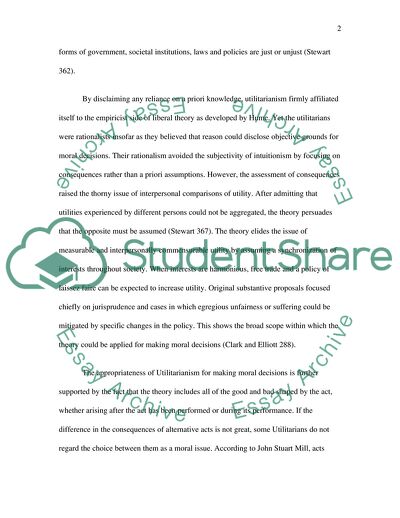
- Home
- Free Samples
- Premium Essays
- Editing Services
- Extra Tools
- Essay Writing Help
- About Us
- Studentshare
- Subjects
- Miscellaneous
- Ethics
Ethics - Essay Example

- Subject: Miscellaneous
- Type: Essay
- Level: Masters
- Pages: 4 (1000 words)
- Downloads: 0
- Author: anabrakus
Extract of sample "Ethics"
points out some external consideration as a means of warranting and guiding the internal sentiments of approbation and disapprobation; this expectation is fulfilled by a proposition which hold up each of those sentiments as a ground and standard itself (Clark and Elliott 273). So the concept of utilitarianism is a suitable tool for making moral decisions. Furthermore, the utilitarian view can be applied either to all spheres of practical life, or can be restricted to some particular sphere. Utilitarianism as a comprehensive doctrine expresses an outlook that can be applied to all practical spheres, for instance, both to the private actions of individuals and to the political structures of societies.
Hence, comprehensive utilitarianism is the view that what makes actions right or wrong is determined by the utilitarian standard, and this very same standard also tells us which forms of government, societal institutions, laws and policies are just or unjust (Stewart 362). By disclaiming any reliance on a priori knowledge, utilitarianism firmly affiliated itself to the empiricist side of liberal theory as developed by Hume. Yet the utilitarians were rationalists insofar as they believed that reason could disclose objective grounds for moral decisions.
Their rationalism avoided the subjectivity of intuitionism by focusing on consequences rather than a priori assumptions. However, the assessment of consequences raised the thorny issue of interpersonal comparisons of utility. After admitting that utilities experienced by different persons could not be aggregated, the theory persuades that the opposite must be assumed (Stewart 367). The theory elides the issue of measurable and interpersonally commensurable utility by assuming a synchronization of interests throughout society.
When interests are harmonious, free trade and a policy of laissez faire can be expected to increase utility. Original substantive proposals focused chiefly on jurisprudence and cases in which
...Download file to see next pages Read MoreCHECK THESE SAMPLES OF Ethics
Business Ethics and Virtue Ethics
Business Ethics & Professinal Ethics
Business Ethics and Virtue Ethics
Engineering Ethics Beyond Engineers' Ethics
Ethics and Cyber-Ethics
Applied ethics ( ethics in marketing)
Personal Ethics Shaping Professional Ethics
Technological Ethics, Cyber Ethics

- TERMS & CONDITIONS
- PRIVACY POLICY
- COOKIES POLICY